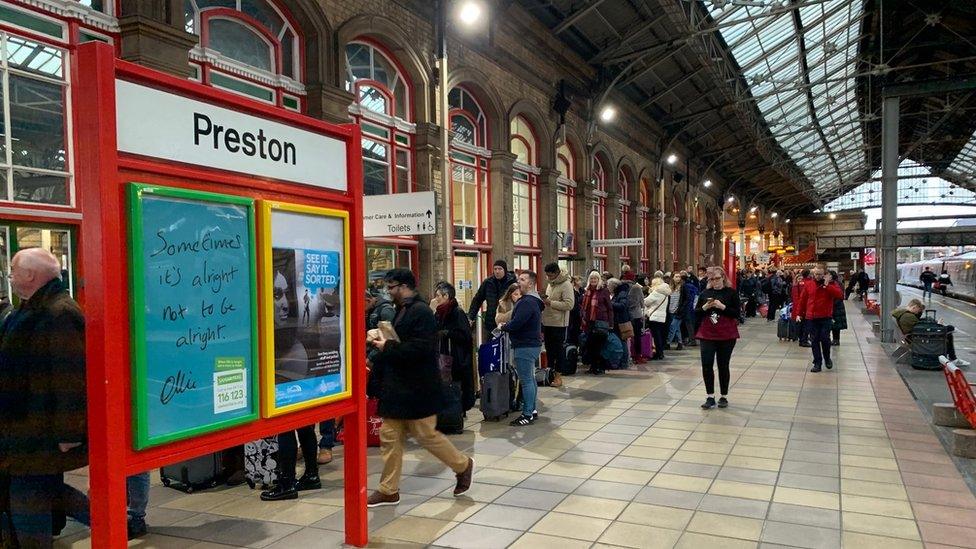West Coast Mainline passengers 'stranded for seven hours'
- Published
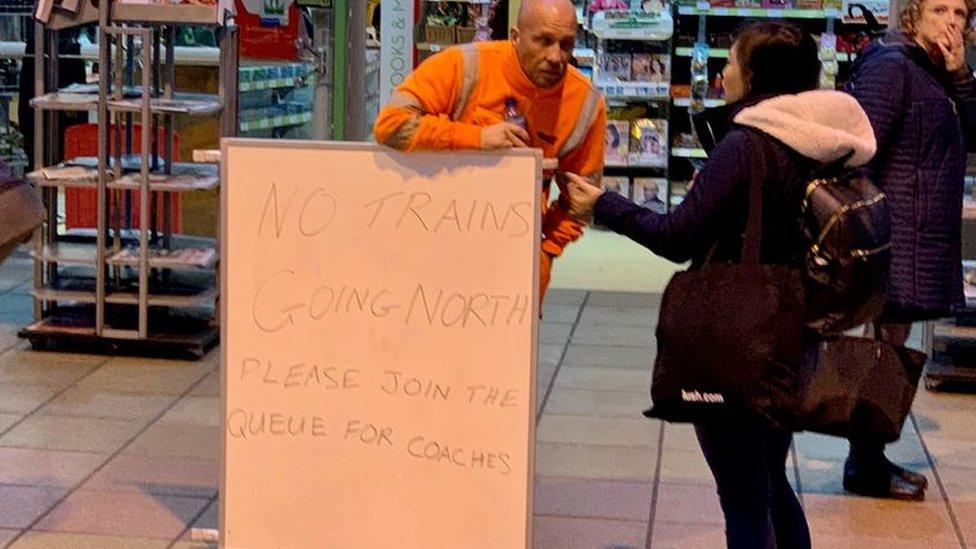
All services running north of Preston have been cancelled until Thursday
Hundreds of passengers on the West Coast Mainline were stranded for hours after an electric overhead cable snapped.
The cable broke on the route between Lancaster and Preston at about 08:35 GMT, blocking both lines in both directions, Network Rail said.
One person tweeted they were on a train for seven-and-a-half hours, another called it "an absolute horror show".
Stations along the route became crowded as the delays continued.
Network Rail said that section of the line would be closed for the rest of the day.
"Our immediate focus is to fix the cables in time for start of service tomorrow," a spokesperson said.
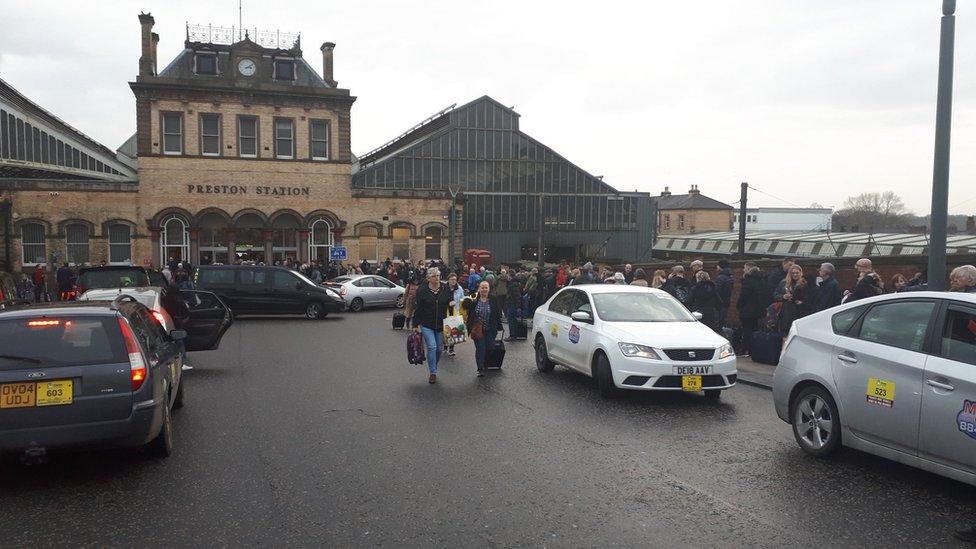
Passengers have been queuing at stations for rail replacement buses
Virgin Trains said a rescue locomotive retrieved two trains and a third was involved in a train-to-train evacuation.
Northern and Trans Pennine Express services in the area were also affected.
All Caledonian Sleeper services were also cancelled.
Passengers expecting to use the route were advised not to travel, and were earlier warned journey times would be at least three hours longer than usual.
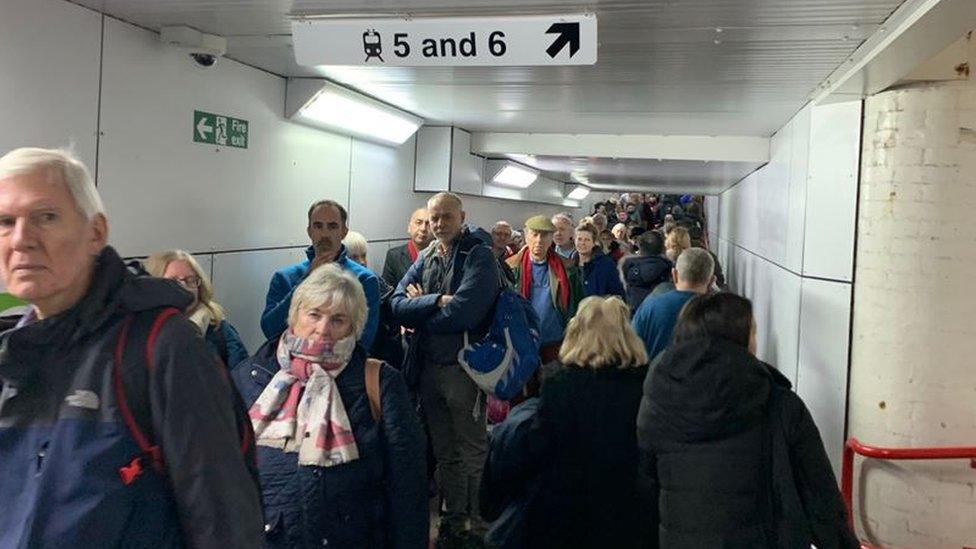
Crowds gathered at Preston station while the delays to services continued
Simon Mabon was travelling from Macclesfield to Lancaster and said his journey - which would normally take about 90 minutes - took about eight hours.
Simon Mabon said there was no air conditioning and the toilets stopped working quickly on his stuck train
Another passenger, Russ Dank, said there was a "bit of a mutiny" on a train he was stranded on in between Preston and Lancaster.
"There were quite a few people shouting because there have been no toilets and it is quite cold... and no lighting for about four hours," he said.
He added some people were "kicking off" as there was nowhere to go to the toilet, but those who were desperate were allowed to go on the "line side" which wasn't "great circumstances".
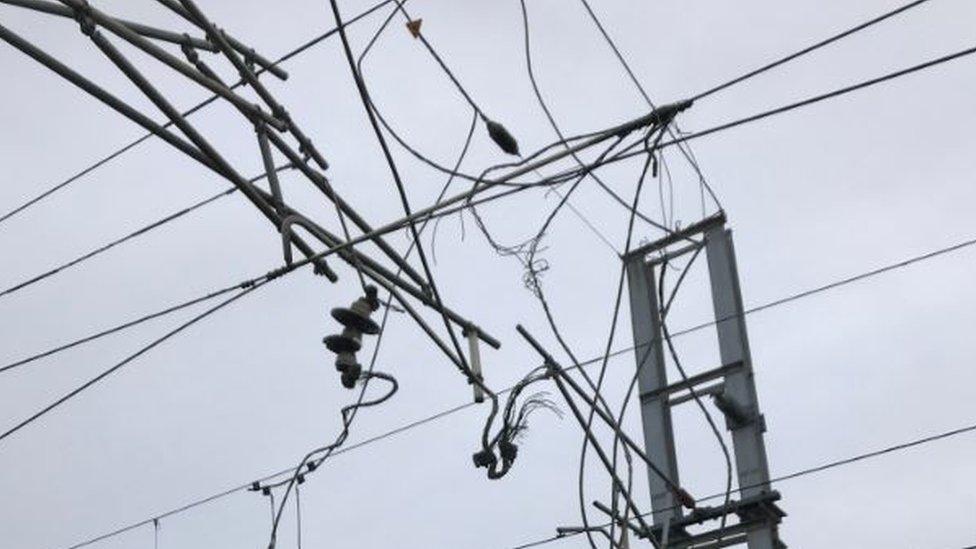
All services between Preston and Lancaster have been cancelled until tomorrow
Phil James, director for Network Rail's North West route, apologised for the issues.
"Our specialist electrical teams are working to repair the damaged cables. It means the railway is blocked with no trains running at present."
Network Rail added because of the lack of electrical power in the area it had made towing back difficult.
Queues formed at Preston station while passengers waited for rail replacement services.
Allow X content?
This article contains content provided by X. We ask for your permission before anything is loaded, as they may be using cookies and other technologies. You may want to read X’s cookie policy, external and privacy policy, external before accepting. To view this content choose ‘accept and continue’.

There were also queues at Oxenholme in the Lake District.
Allow Instagram content?
This article contains content provided by Instagram. We ask for your permission before anything is loaded, as they may be using cookies and other technologies. You may want to read Meta’s Instagram cookie policy, external and privacy policy, external before accepting. To view this content choose ‘accept and continue’.

Virgin Trains said the disruption would continue until Thursday.
"We're very sorry for the experience of customers affected by today's disruption. We're working closely with our partners to get customers from the affected trains to the nearest station so they can continue their journeys," a spokesperson said.
It is not yet known what caused the damage to the 440 yards (400m) of cable.
Virgin passengers can use their tickets on Thursday, the company said.
Allow X content?
This article contains content provided by X. We ask for your permission before anything is loaded, as they may be using cookies and other technologies. You may want to read X’s cookie policy, external and privacy policy, external before accepting. To view this content choose ‘accept and continue’.

Have your travel plans been affected? Share your experiences by emailing haveyoursay@bbc.co.uk, external.
Please include a contact number if you are willing to speak to a BBC journalist. You can also contact us in the following ways:
WhatsApp: +44 7756 165803, external
Tweet: @BBC_HaveYourSay, external
Send pictures/video to yourpics@bbc.co.uk, external
Text an SMS or MMS to 61124 or +44 7624 800 100
Please read our terms of use and privacy policy
- Published25 November 2019
